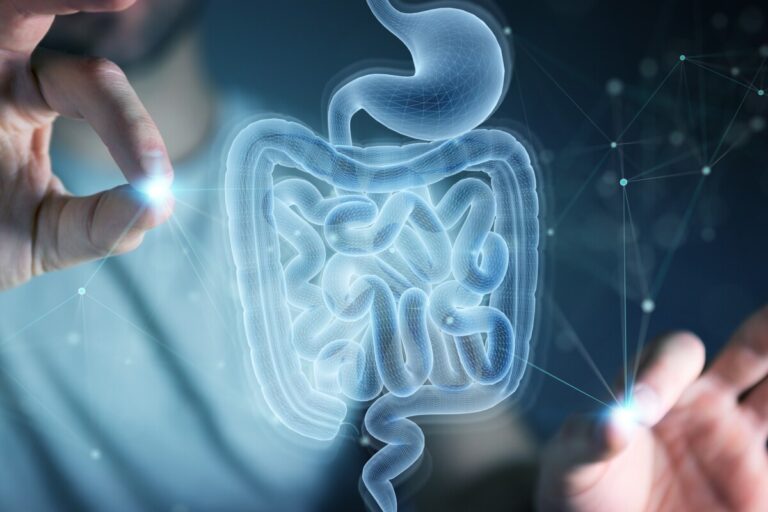
Your gut biome is filled with trillions of bacteria working together to keep you alive. They produce neurotransmitters that make your brain work, control your body’s immune response, burn fat, manage inflammation, and do a handful of other things that help you function at your best.
You want to keep your gut bacteria happy. A strong gut biome will improve your cognition, slow down aging, and keep you at your physical peak—and if bad bacteria take over your gut, they’ll drive brain fog, stress, fatigue, and inflammation, leaving you sick and weak.
If you’ve been biohacking for a while, you probably already know about probiotics—good gut bacteria that you can get from yogurt, kimchi, kombucha, and other fermented products, or from a supplement.
You may also know about prebiotics—compounds like fiber that feed good gut bacteria and help them grow stronger, beating out bad bacteria so your gut biome stays in balance.
Today, I want to talk about something new: postbiotics. They’re a missing piece of the gut biome puzzle, and recent research suggests that they’re a powerful way to upgrade your gut and make your body and brain more efficient.
What Are Postbiotics?
Your good gut bacteria eat prebiotic fiber as fuel, turning it into energy that they can use to grow stronger. Researchers used to think the cycle ended there: if you feed your gut bacteria prebiotics, you’ll have better gut health.
According to new research, there’s another step in the process. It turns out your gut bacteria don’t just take energy from prebiotics; they also use them to create postbiotics, a variety of special compounds that upgrade your body and brain even more.
The International Scientific Association of Probiotics and Prebiotics (ISAPP) defines a postbiotic as a “preparation of inanimate microorganisms and/or their components that confers a health benefit on the host.”[4]
In other words, your gut microbiome takes compounds from the food you eat (i.e. fiber and polyphenols) and converts it to unique substances that help you thrive. These substances are called postbiotics.[5]
Urolithin A: Upgrade Your Brain and Energy with This Unique Postbiotic
According to recent research, you’ll benefit from one of the best postbiotics if you eat lots of polyphenols.
Ellagitannins (ET) and ellagic acid (EA) are two polyphenols you get from pomegranates, berries, and colorful veggies. Your gut bacteria convert these polyphenols into Urolithin A (UA), a powerful postbiotic. [6]
UA is the only postbiotic that turns on mitophagy, which is like spring cleaning for your mitochondria. Your mitochondria produce all the energy your body and brain use to function, and when you age, deal with chronic stress, or eat a poor diet, your mitochondrial energy production drops. Mitophagy can reverse that process, clearing out damaged parts and making your mitochondria young and efficient again.
Impaired mitophagy can increase your risk of several age-related conditions, including cancers, cardiovascular disease, and neurodegenerative disease—while boosting mitophagy seems to stave off aging and keep you strong, both mentally and physically.[7]
I’ve talked about eating high-polyphenol foods before. However, in the case of Urolithin A and mitophagy, research suggests that only about 40% of people can convert polyphenols into Urolithin A.
Your microbiome plays a critical role in determining whether or not you can make this postbiotic. The lower the diversity in your gut bacteria and the fewer good bacteria you have, the less likely you are to make UA.[8] Unfortunately, this may not be something you can fix with diet or probiotics—a lot of it seems to be either genetic or dependent on how your gut microbiome developed when you were young.
With a low percentage of UA producers in the population, direct supplementation may be the only way you can reach therapeutic levels of Urolithin A.
Research shows that supplementing with 500 mg of UA a day can increase your systemic UA levels about six times more efficiently than eating high-polyphenol foods does.[9]
Choose the Right Urolithin-A Supplement
Supplementing with postbiotics has a few advantages over probiotic supplementation. Postbiotics are shelf stable and they eliminate the need to introduce live microorganisms, which may be especially beneficial if you have an underdeveloped or impaired immune system or a particularly sensitive gut. Lastly, you don’t have to alter your gut bacteria to benefit from postbiotics—they improve your performance directly.
Like about 60% of the population, I don’t have the right microbiome to convert enough Urolithin A from diet alone. I’ve been supplementing with UA on a daily basis and I’ve seen a measurable difference in my performance. My mental turnover is faster and I have significantly more energy.
My go-to source of Urolithin A is Mitopure. It’s one of the few supplement companies I trust, partly because of how transparent it is with its ingredients and manufacturing process. I take it every day, and I take a double dose when I’m short on sleep or have to pull an all-nighter. I also take it after international flights because the mitochondrial boost is great at getting rid of jet lag.
If you want to upgrade your mitochondria and strengthen your gut, Urolithin A is an excellent option. And keep an eye out for more info about postbiotics—they’re one of the most promising areas of biohacking and I’ll be writing about them more as new research comes out. Try Mitopure. for yourself and get 10% off any plan with code Dave10.
References
1 Guinane CM, Cotter PD. Role of the gut microbiota in health and chronic gastrointestinal disease: understanding a hidden metabolic organ. Therap Adv Gastroenterol. 2013;6(4):295-308. doi:10.1177/1756283X13482996
2 Salminen S, Collado MC, Endo A, et al. The International Scientific Association of Probiotics and Prebiotics (ISAPP) consensus statement on the definition and scope of postbiotics. Nat Rev Gastroenterol Hepatol. 2021;18(9):649-667. doi:10.1038/s41575-021-00440-6
3 Salminen S, Collado MC, Endo A, et al. The International Scientific Association of Probiotics and Prebiotics (ISAPP) consensus statement on the definition and scope of postbiotics. Nat Rev Gastroenterol Hepatol. 2021;18(9):649-667. doi:10.1038/s41575-021-00440-6
4 Salminen S, Collado MC, Endo A, et al. The International Scientific Association of Probiotics and Prebiotics (ISAPP) consensus statement on the definition and scope of postbiotics. Nat Rev Gastroenterol Hepatol. 2021;18(9):649-667. doi:10.1038/s41575-021-00440-6
5 ?ó?kiewicz J, Marzec A, Ruszczy?ski M, Feleszko W. Postbiotics—A Step Beyond Pre- and Probiotics. Nutrients. 2020;12(8):2189. doi:10.3390/nu12082189
6 D’Amico D, Andreux PA, Valdés P, Singh A, Rinsch C, Auwerx J. Impact of the Natural Compound Urolithin A on Health, Disease, and Aging. Trends in Molecular Medicine. 2021;27(7):687-699. doi:10.1016/j.molmed.2021.04.009
7 Chen G, Kroemer G, Kepp O. Mitophagy: An Emerging Role in Aging and Age-Associated Diseases. Frontiers in Cell and Developmental Biology. 2020;8:200. doi:10.3389/fcell.2020.00200
8 Singh A, D’Amico D, Andreux PA, et al. Direct supplementation with Urolithin A overcomes limitations of dietary exposure and gut microbiome variability in healthy adults to achieve consistent levels across the population. Eur J Clin Nutr. Published online June 11, 2021:1-12. doi:10.1038/s41430-021-00950-1
9 Singh A, D’Amico D, Andreux PA, et al. Direct supplementation with Urolithin A overcomes limitations of dietary exposure and gut microbiome variability in healthy adults to achieve consistent levels across the population. Eur J Clin Nutr. Published online June 11, 2021:1-12. doi:10.1038/s41430-021-00950-1









